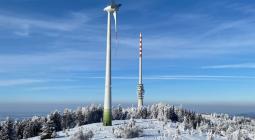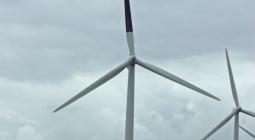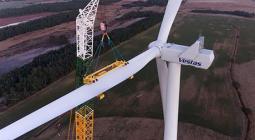Good vibrations: bladeless turbines could bring wind power to your home.

Skybrators’ generate clean energy without environmental impact of large windfarms, say green pioneers.
The giant windfarms that line hills and coastlines are not the only way to harness the power of the wind, say green energy pioneers who plan to reinvent wind power by forgoing the need for turbine towers, blades – and even wind.
“We are not against traditional windfarms,” says David Yáñez, the inventor of Vortex Bladeless. His six-person startup, based just outside Madrid, has pioneered a turbine design that can harness energy from winds without the sweeping white blades considered synonymous with wind power.
The design recently won the approval of Norway’s state energy company, Equinor, which named Vortex on a list of the 10 most exciting startups in the energy sector. Equinor will also offer the startup development support through its tech accelerator programme.
The bladeless turbines stand at 3 metres high, a curve-topped cylinder fixed vertically with an elastic rod. To the untrained eye it appears to waggle back and forth, not unlike a car dashboard toy. In reality, it is designed to oscillate within the wind range and generate electricity from the vibration.
It has already raised eyebrows on the forum site Reddit, where the turbine was likened to a giant vibrating sex toy, or “skybrator”. The unmistakably phallic design attracted more than 94,000 ratings and 3,500 comments on the site. The top rated comment suggested a similar device might be found in your mother’s dresser drawer. It received 20,000 positive ratings from Reddit users.
“Our technology has different characteristics which can help to fill the gaps where traditional windfarms might not be appropriate,” says Yáñez.
These gaps could include urban and residential areas where the impact of a windfarm would be too great, and the space to build one would be too small. It plugs into the same trend for installing small-scale, on-site energy generation, which has helped homes and companies across the country save on their energy bills.
This could be wind power’s answer to the home solar panel, says Yáñez.
“They complement each other well, because solar panels produce electricity during the day while wind speeds tend to be higher at night,” he says. “But the main benefit of the technology is in reducing its environmental impact, its visual impact, and the cost of operating and maintaining the turbine.”
The turbine is no danger to bird migration patterns, or wildlife, particularly if used in urban settings. For the people living or working nearby, the turbine would create noise at a frequency virtually undetectable to humans.
“Today, the turbine is small and would generate small amounts of electricity. But we are looking for an industrial partner to scale up our plans to a 140 metre turbine with a power capacity of 1 megawatt,” says Yáñez.
Vortex is not the only startup hoping to reinvent wind power. Alpha 311, which began in a garden shed in Whitstable, Kent, has begun manufacturing a small vertical wind turbine that it claims can generate electricity without wind.
The 2 metre turbine, made from recycled plastic, is designed to fit on to existing streetlights and generate electricity as passing cars displace the air. Independent research commissioned by the company has found that each turbine installed along a motorway could generate as much electricity as 20 sq metres of solar panels, more than enough electricity to keep the streetlight on and help power the local energy grid, too.
A scaled down version of the turbine, standing at less than 1 metre, will be installed at the O2 Arena in London where it will help to generate clean electricity for the 9 million people who visit the entertainment venue in a usual year.
“While our turbines can be placed anywhere, the optimal location is next to a highway, where they can be fitted on to existing infrastructure. There’s no need to dig anything up, as they can attach to the lighting columns that are already there and use the existing cabling to feed directly into the grid,” says Mike Shaw, a spokesperson for the company. “The footprint is small, and motorways aren’t exactly beauty spots.”
Perhaps the most ambitious divergence from the standard wind turbine has emerged from the German startup SkySails, which hopes to use an airborne design to harness wind power directly from the sky.
SkySails makes large fully automated kites designed to fly at altitudes of 400 metres to capture the power of high-altitude winds. During its ascent the kite pulls a rope tethered to a winch and a generator on the ground. The kite generates electricity as it rises into the sky and, once completely unspooled, uses only a fraction of the electricity generated to winch back towards the ground.
Stephan Wrage, the chief executive of SkySails, says the airborne wind energy systems mean “the impact on people and the environment is minimal …The systems work very quietly, practically have no visible effect on the landscape and barely cast a shadow,” he adds.
Today, the design can generate a maximum capacity of 100 to 200 kilowatts, but a new partnership with the German energy firm RWE could increase the potential output from kilowatts to megawatts. A spokesperson for RWE said the pair are currently looking for the ideal kite-flying site in the German countryside.
16 March 2021
The Guardian





